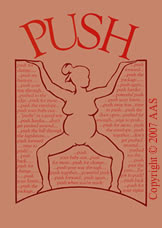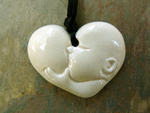I suddenly saw the estrangement that we’d been studying was not innate to “the human condition,” but a direct result of how we isolate babies and young children. Personally, I could also see how the old wounds I thought I had handled in therapy were still there.
-- John Travis, MD
Why Men Leave—A Hidden Epidemic
by John W. Travis,
Metung, Victoria, Australia
Assertion: Modern culture is in the midst of a hidden epidemic of fathers leaving their families—usually around the time when the first child is born. Men leave their families in a multitude of ways. Even if they remain in the home, many fathers are often emotionally absent—through depression, workaholism, violence/aggression, physical or emotional abuse, or a retreat into addiction to substances, media, consumer goods, sports, food or sex.
This is a great article that is a seque into one that I will be posting -- It's the Baby's Birth. I am posting it here now because it shares the author's birth of the forties, during the height of obstetric intervention. Today, obstetricians continue to claim that birth in the hospital is safest for the baby and insist that interventions are not harmful. This is how they have the balls to continue to do non-medically necessary interventions on babies. My post -- AGAIN -- will ask you to consider that what we do to babies during labor and birth has critical impact on their nervous system. I will also post more about the impact of modern birth on men.
Travis writes:
I was born in the farmlands of western Ohio in 1943. Like most babies born in those days, I was drugged (via my mother’s general anesthetic, which took weeks to wear off), dragged out of the womb with cold, metal forceps, grasped by sticky rubber gloves, and plunged into bright lights—instead of being gently greeted with warm hands in subdued light. I was doubtless held upside down to drain my lungs (I’m not sure if I was slapped or not, but that was the norm of the day). Stinging silver nitrate was put in my eyes. I was wrapped in cold, scratchy fabrics instead of being allowed to mold my skin against the warm skin of the person with whom I’d been intimately connected for nine months. A little while later, I was taken to the nursery where I was placed in a plastic box beside Carol D., born earlier that day. I spent my next 10 days there (the norm for the early ‘40s). I was given a cold, rubber nipple with a bottle of a fatty, antigenic substance instead of the miracle food that three million years of evolution had prepared for me.
Then, a day or so later, I was immobilized on a board and the majority of the most sensitive nerve endings of my penis were amputated.
Then followed the standard “normative abuse” parenting practices of the 1940s:
1) artificial baby milk—probably Carnation or Pet Evaporated Milk,
2) a four-hour bottle schedule (I got hungry every three hours and cried that last hour, until I learned it was no use and made a decision about the world that is so basic to my brain’s neural organization that it still impacts almost everything I do—Asking for what I want doesn’t work—my needs will never be met.),
3) restraint in a crib or playpen,
4) deprivation of the continual movement of being carried in-arms,
5) sleeping alone in a separate room.
Most of these ’improvements’ were devised by men propagating, in the name of ‘modern child rearing practices,’ untested ‘scientific’ ideas, all of which have since been proven to be destructive to human bonding. I don’t blame my or other parents of that age: they naturally followed the cultural winds, and the promise of science and technology to cure the world’s ills was, in 1943, still an untarnished vision.
From the very beginning, I used depression as my primary defense against recognizing my inability to get my nurturing needs met. While my primary defense appears outwardly as depression—closing down my senses and feelings by withdrawing into my head—it’s just one of a standard set of defenses that unbonded children/adults cling to in their attempts to escape the pain of the early needs deprivation that still eats away at them. Other defenses include addiction, violence, chronic illness, and ecocide (destruction of the environment)—symptoms of what James Prescott named Somato-Sensory Affectional Deprivation Syndrome (SSADS) in his early bonding research.
I created a “safe” world in my head that allowed me a sense of control (since I had no control over being fed, touched, or held). The fact that I was disconnected from the matrix of my life by being isolated from others, most especially my mother, limited my ability to express my needs and get them met—hence the periodic depressions. No one recognized my depressions, including me, until I was in college—people just thought I was “quiet.”
Read the full article at http://www.compleatmother.com/articles2/why_men_leave.htm
James Prescott's work from his research at NIH is at www.violence.de
John W. Travis is a coauthor of the Wellness Workbook, co-directs the Alliance for Transforming the Lives of Children: http://www.aTLC.org , and is available to speak on this subject and many other areas of wellness for both adults and children. His Wellness Inventory Online is available at http://www.thewellspring.com .
The Other Side of the Glass
Part One was officially released June 2013 in digital distribution format.
To purchase to to www.theothersideoftheglass.com
If you were a donor and want to download your copy send an email to theothersideoftheglassfilm@gmail.com.
The trailer
Saturday, April 21, 2007
Subscribe to:
Post Comments (Atom)
"Soft is the heart of a child. Do not harden it."
A public awareness reminder that things that happen behind the scenes, out of our sight, aren't always as rosy as we might think them to be. Perhaps its a restaurant cook who accidentally drops your burger
on the floor before placing it on the bun and serving it to you. Here it's an overworked apathetic (pathetic) nurse giving my newborn daughter her first bath.
Please comment and rate this video, so as to insure that it is viewed as widely as possible, perhaps to prevent other such abuse. -- The mother who posted this YouTube. How NOT to wash a baby on YouTube
Are you going to try to tell me that "babies don't remember?" There is no difference to this baby's experience and the imprinting of her nervous system/brain and one that is held and cleaned by the mother or father either at the hospital or at home?
By the way, this is probably NOT the baby's first bath. The nurse is ungloved. Medical staff protocol is that they can't handle a baby ungloved until is has been bathed (scrubbed if you've seen it) because the baby is a BIO-HAZARD -- for them. Never mind that the bio-hazard IS the baby's first line of defense against hospital germs.
Missouri Senator Louden Speaks
Finally, A Birth Film for Fathers
Part One of the "The Other Side of the Glass: Finally, A Birth Film for and about Men" was released June, 2013.
Through presentation of the current research and stories of fathers, the routine use of interventions are questioned. How we protect and support the physiological need of the human newborn attachment sequence is the foundation for creating safe birth wherever birth happens.
Based on knowing that babies are sentient beings and the experience of birth is remembered in the body, mind, and soul, fathers are asked to research for themselves what is best for their partner and baby and to prepare to protect their baby.
The film is designed for midwives, doulas, and couples, particularly fathers to work with their caregivers. Doctors and nurses in the medical environment are asked to "be kind" to the laboring, birthing baby, and newborn. They are called to be accountable for doing what science has been so clear about for decades. The mother-baby relationship is core for life. Doctors and nurses and hospital caregivers and administrators are asked to create protocols that protect the mother-baby relationship.
Men are asked to join together to address the vagaries of the medical system that harm their partner, baby and self in the process of the most defining moments of their lives. Men are asked to begin to challenge the system BEFORE they even conceive babies as there is no way to be assured of being able to protect his loved ones once they are in the medical machine, the war zone, on the conveyor belt -- some of the ways that men describe their journey into fatherhood in the medicine culture.
Donors can email theothersideoftheglassfilm@gmail.com to get a digital copy.
Through presentation of the current research and stories of fathers, the routine use of interventions are questioned. How we protect and support the physiological need of the human newborn attachment sequence is the foundation for creating safe birth wherever birth happens.
Based on knowing that babies are sentient beings and the experience of birth is remembered in the body, mind, and soul, fathers are asked to research for themselves what is best for their partner and baby and to prepare to protect their baby.
The film is designed for midwives, doulas, and couples, particularly fathers to work with their caregivers. Doctors and nurses in the medical environment are asked to "be kind" to the laboring, birthing baby, and newborn. They are called to be accountable for doing what science has been so clear about for decades. The mother-baby relationship is core for life. Doctors and nurses and hospital caregivers and administrators are asked to create protocols that protect the mother-baby relationship.
Men are asked to join together to address the vagaries of the medical system that harm their partner, baby and self in the process of the most defining moments of their lives. Men are asked to begin to challenge the system BEFORE they even conceive babies as there is no way to be assured of being able to protect his loved ones once they are in the medical machine, the war zone, on the conveyor belt -- some of the ways that men describe their journey into fatherhood in the medicine culture.
Donors can email theothersideoftheglassfilm@gmail.com to get a digital copy.
Buy the film at www.theothersideoftheglass.com.
The film focuses on the male baby, his journey from the womb to the world and reveals healing and integrating the mother, father, and baby's wounded birth experience. The film is about the restoring of our families, society, and world through birthing loved, protected, and nurtured males (and females, of course). It's about empowering males to support the females to birth humanity safely, lovingly, and consciously.
Finally, a birth film for fathers.
The film focuses on the male baby, his journey from the womb to the world and reveals healing and integrating the mother, father, and baby's wounded birth experience. The film is about the restoring of our families, society, and world through birthing loved, protected, and nurtured males (and females, of course). It's about empowering males to support the females to birth humanity safely, lovingly, and consciously.
Finally, a birth film for fathers.
What People Are Saying About the FIlm
Well, I finally had a chance to check out the trailer and .. wow! It's nice that they're acknowledging the father has more than just cursory rights (of course mom's rights are rarely acknowledged either) and it's great that they're bringing out the impact of the experience on the newborn, but I'm really impressed that they're not shying away from the political side.
They are rightly calling what happens in every American maternity unit, every day, by its rightful name - abuse. Abuse of the newborn, abuse of the parents and their rights, abuse of the supposedly sacrosanct ethical principal of patient autonomy and the medico-legal doctrine of informed consent, which has been long ago discarded in all but name. I love it!
In the immortal words of the "shrub", "bring it on!" This film needs to be shown and if I can help facilitate or promote it, let me know.
Father in Asheville, NC
Thanks for sharing this. It was very touching to me. I thought of my brother-in-law standing on the other side of the glass when my sister had to have a C-section with her first child because the doctor was missing his golf date. I'll never forget his pacing back and forth and my realizing that he was already a father, even though he hadn't been allowed to be with his son yet.
Margaret, Columbia, MO
They are rightly calling what happens in every American maternity unit, every day, by its rightful name - abuse. Abuse of the newborn, abuse of the parents and their rights, abuse of the supposedly sacrosanct ethical principal of patient autonomy and the medico-legal doctrine of informed consent, which has been long ago discarded in all but name. I love it!
In the immortal words of the "shrub", "bring it on!" This film needs to be shown and if I can help facilitate or promote it, let me know.
Father in Asheville, NC
OMG'ess, I just saw the trailer and am in tears. This is so needed. I watch over and over and over as fathers get swallowed in the fear of hospitals birth practice. I need a tool like this to help fathers see how very vital it is for them to protect their partner and baby. I am torn apart every time I see a father stand back and chew his knuckle while his wife is essentially assaulted or his baby is left to lie there screaming.
Please send me more info!!!!
Carrie Hankins
CD(DONA), CCCE, Aspiring Midwife
720-936-3609
Thanks for sharing this. It was very touching to me. I thought of my brother-in-law standing on the other side of the glass when my sister had to have a C-section with her first child because the doctor was missing his golf date. I'll never forget his pacing back and forth and my realizing that he was already a father, even though he hadn't been allowed to be with his son yet.
Margaret, Columbia, MO
In case you don't find me here
Soon, I'll be back to heavy-duty editing and it will be quiet here again. I keep thinking this blog is winding down, and then it revives. It is so important to me.
I wish I'd kept a blog of my journey with this film this past 10 months. It's been amazing.
I have a new blog address for the film, and will keep a journal of simple reporting of the journey for the rest of the film.
www.theothersideoftheglassthefilm.blogspot.com
I'll be heading east this week to meet with a group of men. I plan to post pictures and clips on the film blog.
I'll keep up here when I can -- when I learn something juicy, outrageous, or inspiring related to making birth safer for the birthing baby.
I wish I'd kept a blog of my journey with this film this past 10 months. It's been amazing.
I have a new blog address for the film, and will keep a journal of simple reporting of the journey for the rest of the film.
www.theothersideoftheglassthefilm.blogspot.com
I'll be heading east this week to meet with a group of men. I plan to post pictures and clips on the film blog.
I'll keep up here when I can -- when I learn something juicy, outrageous, or inspiring related to making birth safer for the birthing baby.
Review of the film
Most of us were born surrounded by people who had no clue about how aware and feeling we were. This trailer triggers a lot of emotions for people if they have not considered the baby's needs and were not considered as a baby. Most of us born in the US were not. The final film will include detailed and profound information about the science-based, cutting-edge therapies for healing birth trauma.
The full film will have the interviews of a wider spectrum of professionals and fathers, and will include a third birth, at home, where the caregivers do a necessary intervention, suctioning, while being conscious of the baby.
The final version will feature OBs, RNs, CNMs, LM, CPM, Doulas, childbirth educators, pre and perinatal psychologists and trauma healing therapists, physiologists, neurologists, speech therapists and lots and lots of fathers -- will hopefully be done in early 2009.
The final version will include the science needed to advocated for delayed cord clamping, and the science that shows when a baby needs to be suctioned and addresses other interventions. Experts in conscious parenting will teach how to be present with a sentient newborn in a conscious, gentle way -- especially when administering life-saving techniques.
The goal is to keep the baby in the mother's arms so that the baby gets all of his or her placental blood and to avoid unnecessary, violating, and abusive touch and interactions. When we do that, whether at home or hospital, with doctor or midwife, the birth is safe for the father. The "trick" for birthing men and women is how to make it happen in the hospital.
The full film will have the interviews of a wider spectrum of professionals and fathers, and will include a third birth, at home, where the caregivers do a necessary intervention, suctioning, while being conscious of the baby.
The final version will feature OBs, RNs, CNMs, LM, CPM, Doulas, childbirth educators, pre and perinatal psychologists and trauma healing therapists, physiologists, neurologists, speech therapists and lots and lots of fathers -- will hopefully be done in early 2009.
The final version will include the science needed to advocated for delayed cord clamping, and the science that shows when a baby needs to be suctioned and addresses other interventions. Experts in conscious parenting will teach how to be present with a sentient newborn in a conscious, gentle way -- especially when administering life-saving techniques.
The goal is to keep the baby in the mother's arms so that the baby gets all of his or her placental blood and to avoid unnecessary, violating, and abusive touch and interactions. When we do that, whether at home or hospital, with doctor or midwife, the birth is safe for the father. The "trick" for birthing men and women is how to make it happen in the hospital.








3 comments:
Thanks for posting about this. Looks to be very interesting reading. Incidentally I was born in 1983 and I was also born drugged. My mother was so drugged in fact, that she didn't realise she had given birth. Her first words to me were: "oh cool, someone bought a baby in here".
When this is the respect we show birth, is it any wonder there is little respect for life?
Powerful words. My mother was drugged when I was born in 1968 and was told not to breastfeed, was given the shot to dry up her breastmilk. When my brother was born 10 months later, she was awake to push him out and the tide has also turned on breastfeeding. She wonders why she had such severe depression after I was born, but not after his birth... (It's probably no mistake that I'm a midwife now, either!)
I've never asked my dad about his experiences with our births. After reading this, I'm quite curious.
Travis's words just make me want to nurse and wear and cuddle all those poor poor babies, two of whom were very likely my parents, born in '45 and '46. Thank you so much for the links.
Post a Comment